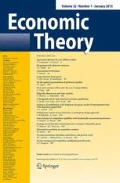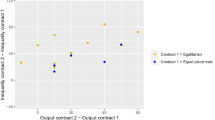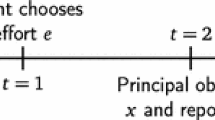Abstract
We show that career concerns can arise in the absence of ex ante uncertainty about an agent’s type, if his unobservable actions influence future productivity. Implementing effort in mixed strategies allows the principal to endogenously introduce uncertainty about the agent’s ex post productivity and generate reputational incentives. Creating such ambiguity can be optimal for the principal, even though this exposes the agent to additional risk and reduces output. This finding for an environment with imperfect commitment contrasts with standard agency models, where implementing mixed strategy actions typically is not optimal if pure strategies can also be implemented.
Similar content being viewed by others
References
Auriol E., Friebel G., Lambros P. (2004) Career concerns in teams. J Labor Econ 20: 289–307
Baker G., Gibbs M., Holmström B. (1994) The wage policy of a firm. Q J Econ 109: 921–955
Bester H., Strausz R. (2001) Contracting with imperfect commitment and the revelation principle: The single agent case. Econometrica 69: 1077–1098
Borland J. (1992) Career concerns: Incentives and endogenous learning in labour markets. J Econ Surveys 6: 251–270
Crémer J. (1995) Arm’s length relationships. Q J Econ 110: 275–295
Dewatripont M., Jewitt I., Tirole J. (1999) The economics of career concerns, part I: Comparing information structures. Rev Econ Stud 66: 183–198
Fingleton J., Raith M. (2005) Career concerns of bargainers. J Law Econ Organ 21: 179–204
Fudenberg D., Tirole J. (1986) Game Theory. MIT Press, Cambridge
Fudenberg D., Tirole J. (1990) Moral hazard and renegotiation in agency contracts. Econometrica 58: 1279–1319
Gibbons R., Murphy K.J. (1992) Optimal incentive contracts in the presence of career concerns: Theory and evidence. J Polit Econ 100: 468–505
Grossman S.J. (1981) The informational role of warranties and private disclosure about product quality. J Law Econ 24: 461–83
Holmström, B.: Managerial incentive problems: a dynamic perspective. Rev Econ Stud 66, 169–182 (1999); originally published in: Essays in Economics and Management in Honour of Lars Wahlbeck, Helsinki (1982)
Kahneman D., Tversky A. (1979) Prospect theory: an analysis of decision under risk. Econometrica 47: 263–292
Khalil F. (1997) Auditing without commitment. RAND J Econ 28: 629–640
Koch, A.K., Peyrache, E.: Aligning ambition and incentives, IZA Discussion Paper No. 1527 (2005a)
Koch, A.K., Peyrache, E.: Tournaments, individualized contracts, and career concerns, IZA Discussion Paper No. 1841 (2005b)
Koessler F. (2004) Strategic knowledge sharing in Bayesian games. Games Econ Behav 48: 292–320
Laffont J.-J., Martimort D. (2002) The Theory of Incentives: The Principal-Agent Model. Princeton University Press, Princeton
Laffont J.-J., Tirole J. (1988) The dynamics of incentive contracts. Econometrica 56: 1153–1175
Meyer M.A., Vickers J. (1997) Performance comparisons and dynamic incentives. J Polit Econ 105: 547–581
Milgrom P.R. (1981) Good news and bad news: representation theorems and applications. Bell J Econ 12: 380–391
Okuno-Fujiwara M., Postlewaite A., Suzumura K. (1990) Strategic information revelation. Rev Econ Stud 57: 25–47
Shin H.S. (1994a) The burden of proof in a game of persuasion. J Econ Theory 64: 253–264
Shin H.S. (1994b) News management and the value of firms. RAND J Econ 25: 58–71
Author information
Authors and Affiliations
Corresponding author
Additional information
We benefited from helpful comments from Jacques Crémer, Uli Hege, Bruno Jullien, Wolfgang Köhler, Albrecht Morgenstern, Georg Nöldeke, Frédéric Palomino, Patrick Rey, Bernard Salanié, Burkhard Schipper, and Patrick Schmitz. Moreover, we thank two anonymous referees for their comments, which helped to significantly improve the paper.
Rights and permissions
About this article
Cite this article
Koch, A.K., Peyrache, E. Mixed up? that’s good for motivation. Economic Theory 34, 107–125 (2008). https://doi.org/10.1007/s00199-007-0206-y
Received:
Revised:
Published:
Issue Date:
DOI: https://doi.org/10.1007/s00199-007-0206-y




